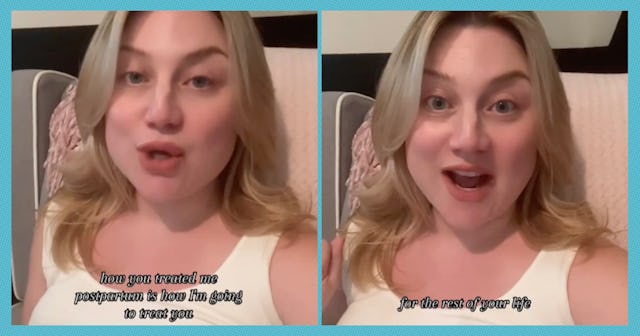A Mom Explains How “People Show Their True Colors” When You Are Postpartum
“How you treated me postpartum is how I'm going to treat you for the rest of your life.”

Postpartum life can be so lonely. Those middle-of-the-night feedings, long days without one conversation with another adult, and feeling tired and dirty and burnt out take a toll. And sometimes, no one reaches out to lend a hand or even sends a “How are you?” text. Though moms are busy and strong and resilient, that doesn’t mean we just forget all those people who completely ghosted, especially if they’re usually there for you.
There is no question that relationships change when someone becomes a parent. This could be due to new boundaries, differing priorities, or just evolving into a new person. And sometimes it’s because you never really realized that people you give support don’t give you that same support back, especially when you need it most.
One mom is telling it exactly how it is in a viral TikTok, explaining that the energy she got from certain people in her life is exactly the kind of energy she is giving back to them — forever.
TikTok content creator and mom Courtney says, “How you treated me postpartum is how I'm going to treat you for the rest of your life. I've had two babies, and I'm pregnant with number three right now and let me tell you something when you are postpartum, when you just had that baby, man, people show their true colors.”
She says that no other time in her life has shown her who really matters in her life and who actually cares about her and her family’s well being.
“You're going to know who cares about you, who respects you, who loves you, who is concerned about you, who respects your boundaries, and you're going to find out who doesn't, and I think you'll agree if you've also given birth that you never forget those feelings, right?” she continued.
Courtney goes on to explain that even though she had her first baby six and a half years ago, she still remembers how she felt being slighted by people in her life that she thought had her back.
She continued, “Some people can make you feel so warm and so appreciated and so loved and so cared for, but some people make you feel like crap. And to those people, I just, I don't have it in me to forgive. You get the same energy back.”
The mom of three and her karmic feelings went viral with over 500k views in less than 24 hours with thousands of parents commenting on her video, noting that they experienced this same betrayal when they became pregnant and had kids.
One user noted that these people who dropped off the face of the earth actually did them a favor.
“Pregnancy & postpartum, as traumatic as it was, freed me of relationships not worth my energy,” they said.
To which Courtney replied, “You’re right and I love your perspective”
Another user commented on how tough mother/daughter relationships can become once a new generation is created.
“My mom tried to make my son almost dying about her. I will NEVER FORGET or FORGIVE her,” they wrote.
“Had a baby in the NICU.. the way relatives made it about them.. and wanted access to her and to pass her around. Wtf,” Courtney replied.
Another validated the OP’s feelings and said, “100%. Had people come to hold the baby days after his birth without even asking 1 question about my recovery, delivery, nothing… it was shocking 😕”
Postpartum life, also known as the fourth trimester, is one of the more draining and vulnerable time for a mom. Yet, it’s also when moms seemingly fade into the background while a new life takes center stage. This is not to say that newborns do not deserve to be doted on, but what about mom?
New moms have recovering bodies, no sleep, and a new tiny creature to take care of — which can be overwhelming, painful, lonely, and scary (on top of the feelings of joy and happiness).
New research shows that loneliness is one of the main components that contributes to postpartum depression.
“We found that loneliness was central to the experiences of expectant and new mothers with depression. We know that depression and loneliness are often interconnected — each one can lead to the other — and this may be particularly true for perinatal depression [which includes postpartum depression],” said Dr. Katherine Adlington, an academic clinical fellow at UCL Psychiatry and East London NHS Foundation Trust.
“Having a baby is a period of huge transition and upheaval that can involve losing touch with people and existing networks, such as work colleagues,” Adlington added in a University College London (UCL) news release. “This research suggests that loneliness is a major risk for mental health problems during pregnancy and for new mothers.”
Moms don’t just deserve extra care after a baby arrives, they need it to stay healthy and to feel loved. When the most important people in her life don’t step up, that sends a message loud and clear that won’t be forgotten.